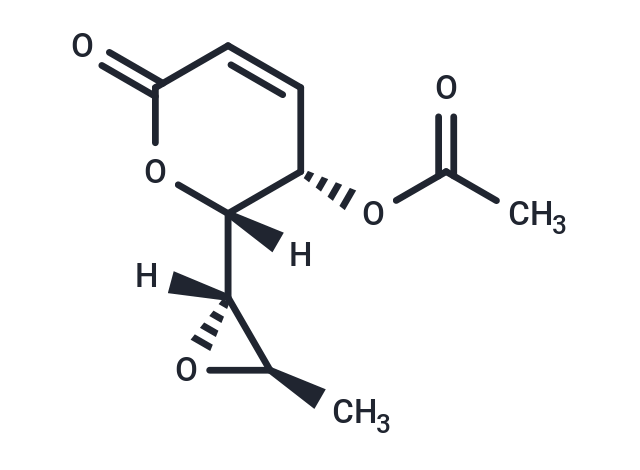Shopping Cart
Remove All Your shopping cart is currently empty
Your shopping cart is currently empty
Asperlin is an orally active marine-derived antibiotic with antifungal, anticancer, anti-inflammatory, and anti-atherosclerotic properties. It can induce apoptosis and increase reactive oxygen species (ROS) and DNA damage-related G2/M phase arrest, as well as ATM phosphorylation. Additionally, Asperlin effectively prevents HFD-induced obesity in vivo and modulates gut microbiota.

| Pack Size | Price | USA Warehouse | Global Warehouse | Quantity |
|---|---|---|---|---|
| 10 mg | Inquiry | Inquiry | Inquiry | |
| 50 mg | Inquiry | Inquiry | Inquiry |
| Description | Asperlin is an orally active marine-derived antibiotic with antifungal, anticancer, anti-inflammatory, and anti-atherosclerotic properties. It can induce apoptosis and increase reactive oxygen species (ROS) and DNA damage-related G2/M phase arrest, as well as ATM phosphorylation. Additionally, Asperlin effectively prevents HFD-induced obesity in vivo and modulates gut microbiota. |
| In vitro | Asperlin, at concentrations of 6-25 μM for 24-48 hours, inhibits cell growth in a dose-dependent manner, induces caspase-3 and PARP cleavage, decreases Bcl-2 levels, and triggers apoptosis. This apoptotic effect in HeLa cells can be blocked by NAC [1]. At 6-25 μM for 24 hours, Asperlin increases ROS and causes DNA damage-related G2/M phase arrest and ATM phosphorylation, which can be significantly blocked by NAC or the ATM inhibitor KU-55933 [1]. Asperlin also exhibits anti-inflammatory properties in macrophages at 5-40 μM for 12 hours, reducing the expression of iNOS and COX-2 induced by LPS, and decreasing the production of TNF-α and IL-1β in mouse peritoneal macrophages and RAW264.7 macrophage cells in a dose-dependent manner [3]. At 500 μg/ml for 1 day, Asperlin effectively controls tomato late blight and wheat leaf rust disease, showing a disease control value of 95% [4]. |
| In vivo | Asperlin (40-80 mg/kg; oral administration; once daily for 12 weeks) effectively prevents obesity development in mice on a high-fat diet (HFD), enhances energy expenditure, and modulates the gut microbiota [2]. Furthermore, Asperlin (80 mg/kg; oral administration; once daily for 12 weeks) significantly inhibits atherosclerotic plaque formation in HFD-fed ApoE-/- mice, leading to reduced aortic dilation and decreased atherosclerotic lesion area [5]. |
| Molecular Weight | 212.199 |
| Formula | C10H12O5 |
| Cas No. | 30387-51-0 |
| Smiles | O(C(C)=O)[C@@H]1[C@@](OC(=O)C=C1)([C@@]2([C@@H](C)O2)[H])[H] |
| Storage | Powder: -20°C for 3 years | In solvent: -80°C for 1 year | Shipping with blue ice/Shipping at ambient temperature. |
| Size | Quantity | Unit Price | Amount | Operation |
|---|

Copyright © 2015-2026 TargetMol Chemicals Inc. All Rights Reserved.